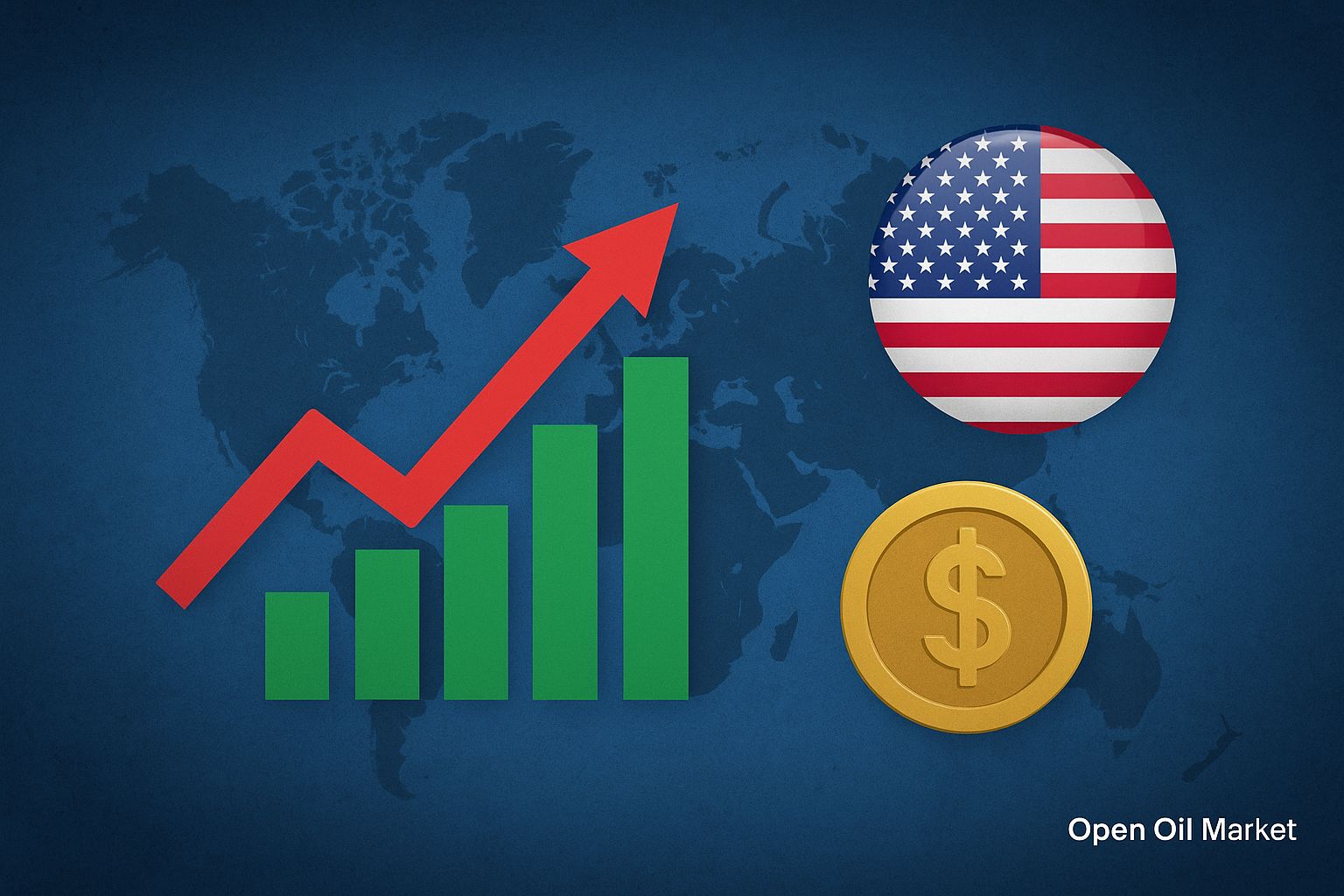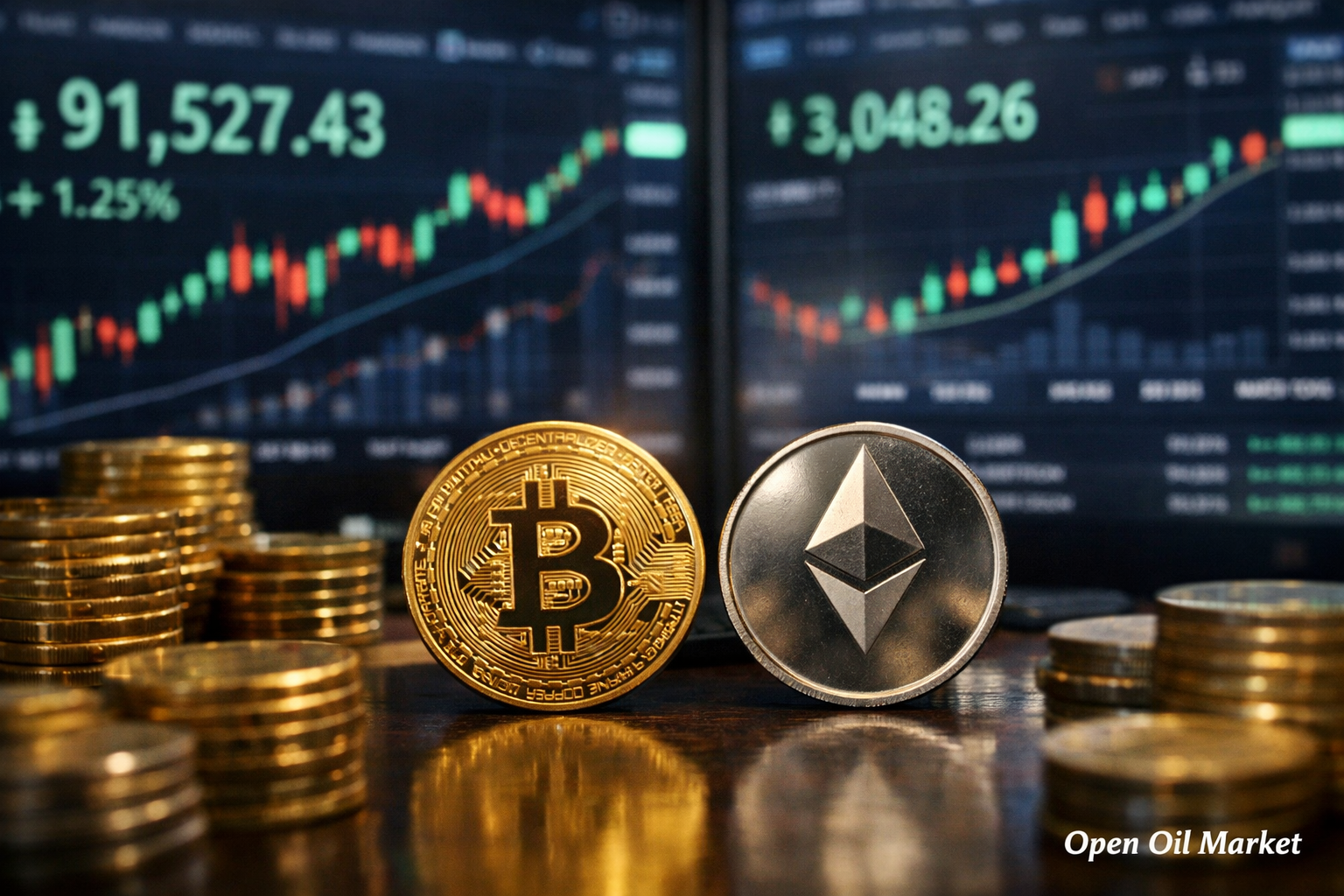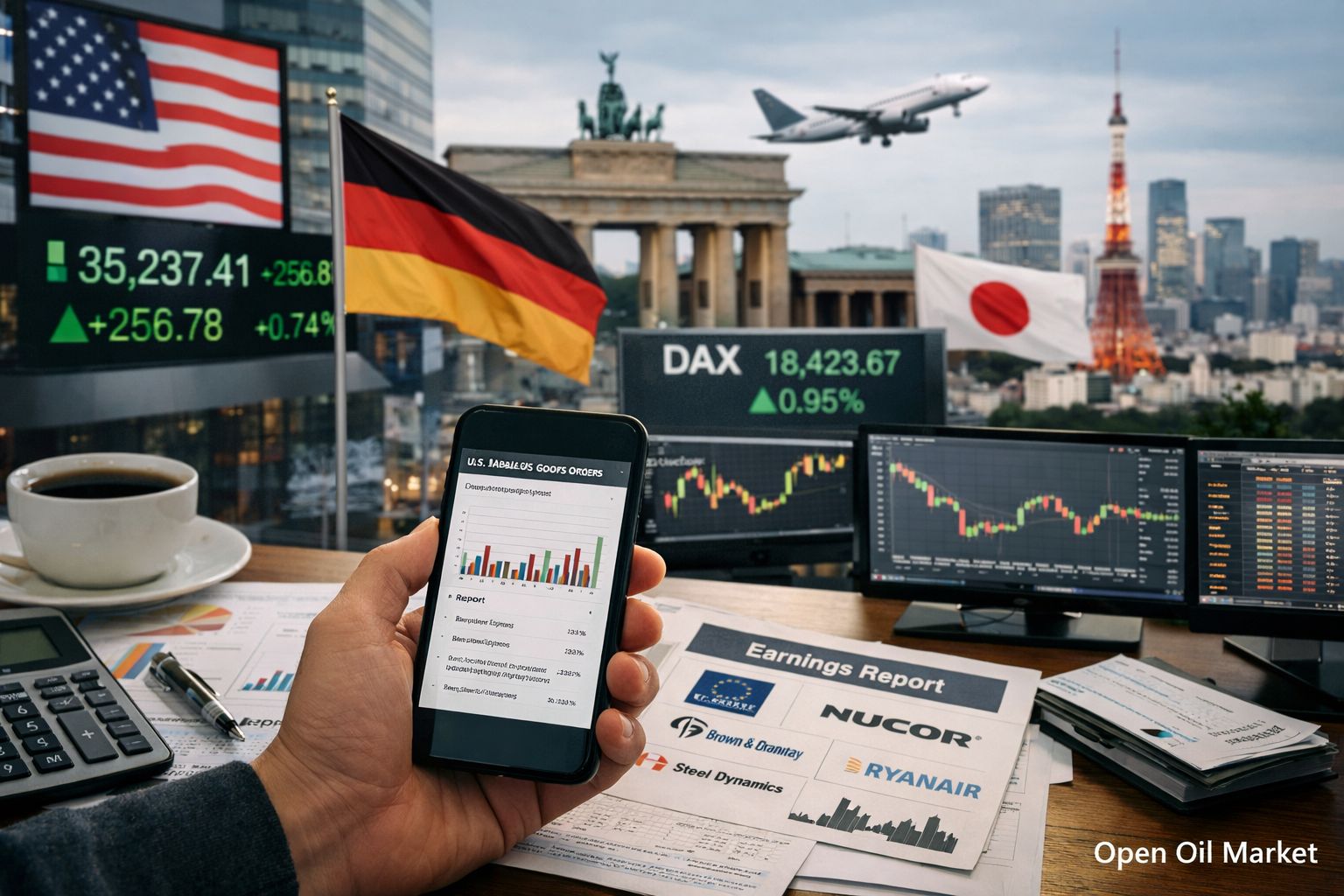
Detailed Overview of Economic Events and Corporate Reports on 29 October 2025. FOMC Meeting, Bank of Canada Decision, Inflation Data from Russia and Australia, US-China Trade Negotiations, as well as Earnings Results from Companies in the US, Europe, Asia, and Russia.
Wednesday presents a packed agenda for investors: in Asia, the focus will be on the release of Australia's Consumer Price Index (CPI) for Q3, while the Hong Kong Stock Exchange is closed for the Chung Yeung Festival. In Europe, trading is halted in Turkey due to Republic Day, and market sentiment will largely depend on global factors. The day's highlight will be the US Federal Reserve's meeting—its outcomes will set the tone for the S&P 500 and other risk assets. Additional elements of the picture include the Bank of Canada's interest rate decision, fresh data on US trade and real estate, a speech by the Governor of the Central Bank of Russia, Elvira Nabiullina, and weekly oil statistics. On the corporate front, a dense flow of earnings reports is expected: in the US, tech giants and the industrial sector will report, in Europe, Adidas and GSK are key releases, in Asia, results from Samsung and major Japanese companies will be watched, and in Russia, Yandex's report will be in focus. Investors need to assess these events collectively: signals from central banks ↔ bond yields ↔ currency rates ↔ commodity prices ↔ risk appetite in the markets.
Macroeconomic Calendar (Moscow Time)
- All day – Hong Kong: holiday (Chung Yeung Festival, stock exchange closed).
- All day – Turkey: holiday (Republic Day, stock exchange closed).
- 03:30 – Australia: Consumer Price Index (CPI) for Q3 2025.
- ~12:00 – Russia: Speech by the head of the Central Bank, Elvira Nabiullina, in the Federation Council.
- 15:30 – US: Trade balance for September (preliminary data).
- 16:45 – Canada: Bank of Canada's key interest rate decision.
- 17:00 – US: Pending Home Sales Index for September.
- 17:30 – Canada: Bank of Canada press conference.
- 17:30 – US: EIA crude oil inventories (weekly statistics).
- 19:00 – Russia: Operational data on inflation (CPI, % year-on-year).
- 21:00 – US: FOMC meeting (final decision on the Fed's interest rate).
- 21:30 – US: Fed Chair press conference following the meeting.
Geopolitics: US-China Trade Negotiations
- Washington and Beijing are conducting ministerial-level trade talks. The focus is on easing tariff restrictions, technology exports, and raw material supplies. Any signs of progress (for instance, agreements on rare earth metals or agricultural imports) will support the global stock market, particularly industrial and technology companies. Conversely, a lack of breakthroughs will keep investors cautious regarding risk assets.
Australia: CPI Index and RBA Policy
- Inflation in Australia for Q3 is expected to accelerate to around 3% year-on-year (up from 2.1% in Q2) amid rising fuel prices and certain services. Such a result may heighten the caution of the Reserve Bank of Australia. While the current level is close to the target range, exceeding this forecast (for instance, a significant quarterly price increase) would increase the likelihood of the RBA maintaining a hawkish stance or even raising rates further. This impacts the Australian dollar and sentiment in Asian markets.
Russia: Inflation and Signals from the Central Bank
- Operational data on consumer inflation in Russia will show how sustainably the pace of price growth is slowing after a recent spike. The annual CPI remains elevated (double-digit values), but a downward trend will be viewed by investors as confirmation of the appropriateness of the recent series of key rate cuts by the Central Bank of Russia. Unexpected inflation spikes could, on the other hand, increase pressure on the rouble and OFZ bonds.
- Elvira Nabiullina will speak in the Federation Council, where she is likely to emphasise the Central Bank's readiness to continue a cautious easing of policy. In the Central Bank Governor's comments, investors will seek hints at the future trajectory of interest rates: a slowdown in domestic demand and the exhaustion of pro-inflationary factors (fuel, harvest) could support arguments for future rate cuts. Any signals in Nabiullina's speech will impact expectations for the rouble and the banking sector.
Oil: EIA Inventory Data
- The US Department of Energy's (EIA) report on commercial oil inventories and petroleum products will provide a short-term benchmark for the energy market. Changes in inventories are expected to be moderate; for example, a decline in crude oil stocks would indicate sustained demand and support prices, while an unexpected increase in stocks could trigger a correction in oil quotes. Investors in the oil and gas sector should closely monitor this publication: oil price volatility will impact energy companies' shares and related currencies.
US Federal Reserve Meeting
- The Federal Reserve concludes its meeting, with the market expecting no drastic changes in the interest rate (the current range is holding close to the peak of the tightening cycle). The main intrigue lies in the rhetoric in the accompanying statement and comments from Jerome Powell. If the Fed acknowledges the slowdown in inflation and the economy, it may signal a pause or even the onset of a rate-cutting cycle soon, which would support stocks and bonds. However, an emphasis on persistently high inflation and a willingness to hold rates at elevated levels longer than expected would boost yields on Treasury bonds and create pressure on the tech sector.
- Key points to watch: the Fed's assessment of the labour market and consumption, the balance of votes in the Committee (whether the position was unanimous), and any hints about future steps. Market reactions can be pronounced—traditionally, the S&P 500 and Nasdaq indices, as well as the dollar and gold, make sharp moves in the minutes immediately following the publication of the decision and during Powell's remarks.
Bank of Canada Decision
- The Bank of Canada will announce its interest rate decision: the consensus expects the key rate to be maintained at current levels, given the stabilisation of inflation close to the 2% target. The accompanying statement is more important—if the regulator indicates risks of overheating in the economy or, conversely, signs of a slowdown, this will affect the Canadian dollar (CAD) and Canadian bond yields. Investors should pay attention to the communication tone: signs of a "hawkish" approach (concern over price pressures) may push the CAD higher, while more "dovish" rhetoric about the need to support growth will have the opposite effect.
Earnings Reports: Before Market Open (BMO, US, Europe, and Asia)
- Boeing (BA) — aerospace giant (Dow Jones). Focus: recovery of production and deliveries of aircraft, achievement of plans to increase 737 MAX output, as well as free cash flow. Investors will assess the dynamics of the new order backlog amid growing demand for air travel and defense contracts.
- Verizon (VZ) — telecom (S&P 500). Key metrics: subscriber growth and churn rate in a saturated mobile market, development of 5G services, and revenue from new services. Management's comments on price competition and dividend forecasts amid high industry debt levels are also significant.
- Samsung Electronics — South Korea, a leader in the KOSPI index. The profitability of its semiconductor division is crucial amid recovering memory prices and demand for chips for AI, along with sales of Galaxy smartphones. Samsung's earnings report will set the tone for the entire Asian tech sector and affect the Nikkei 225 index through supply chains.
- Keyence Corp (6861.T) — Japan, high-tech company (Nikkei 225). The producer of sensors and automation systems reports for the half-year. Key focal points: revenue growth in global industrial markets, operating margin, and the influence of the yen's exchange rate. Keyence's results serve as a barometer for demand for industrial automation globally.
- Adidas (ADS) — Germany, leading consumer sector company (DAX, Euro Stoxx 50). Q3 earnings will reflect sales dynamics in sports clothing and footwear. Investors are looking for revenue recovery in China, North America, and Europe, stock levels, and profitability—particularly considering fluctuations in exchange rates and commodity prices.
- GSK (GSK) — UK, pharmaceuticals (FTSE 100). Key points in the quarterly report are sales of key drugs (e.g., Shingrix vaccine and new drugs in the pipeline) and a revised annual forecast. The market will also assess comments on progress in new drug development and the impact of price pressures on margins. GSK's release will set the tone for the European pharma sector.
- Yandex (YNDX) — Russia, IT giant (MOEX outside the index). The company will present its IFRS results for Q3: focus on the dynamics of advertising revenue in the search business segment, growth in e-commerce and taxi services, as well as operational profitability after asset separation. Investors in the Russian tech sector are looking for signals from Yandex regarding business recovery and prospects for corporate restructuring.
Earnings Reports: After Market Close (AMC, US)
- Meta (META) — US, internet sector (FAANG). Key metrics: advertising revenue growth from Facebook, Instagram, and WhatsApp, audience size and engagement (MAU/DAU), as well as expenditures on metaverse development and AI infrastructure. Meta's results will set the tone for the entire technology sector in NASDAQ; management's revenue outlook amid slowing economic growth and advertising competition is particularly crucial.
- Alphabet (GOOGL) — US, technology holding (FAANG). Key points of focus: revenue from Google search and advertising (Google Services segment) and further growth of Google Cloud's cloud business. Investors are also monitoring comments on the implementation of generative AI into the company's products and cost control. A strong report from Alphabet will support the Nasdaq and S&P 500, while weak results, especially from the cloud, could trigger sell-offs in the sector.
- eBay (EBAY) — US, e-commerce platform. Metrics: gross merchandise volume (GMV) on the platform, number of active buyers and sellers, average transaction value. The market will assess the success of its monetisation strategy (commissions, advertising) and forecasts for the holiday quarter. eBay's report will provide insight into online consumer activity levels and competition with other marketplaces.
- Starbucks (SBUX) — US, consumer sector. The coffee shop chain will report for financial Q4 2025. Important metrics: comparable sales (LFL) in key regions – primarily in China and North America, where demand dynamics differ. Prices of raw materials and personnel expenses impact the company's margins; investors expect comments on growth strategies (opening new outlets, developing loyalty programs). Starbucks' results reflect the state of the retail food sector and the variability of consumer preferences.
Other Regions and Indices: Euro Stoxx 50, Nikkei 225, MOEX
- Euro Stoxx 50: The European market is in the midst of earnings season. As of 29 October, numerous large issuers have reported results that kept index levels close to multi-year highs. Adidas' report will add colour to the consumer sector, while macroeconomic statistics from the Eurozone (preliminary GDP data, sentiment index) shape the overall backdrop. The focus is on the banking and industrial sectors, sensitive to interest rates and global trade.
- Nikkei 225: The Japanese stock market consolidates near historical peaks (over 50,000 points on Nikkei 225 futures). The half-year reporting season continues: strong results from tech companies (Keyence, NEC) and industrial corporations (Komatsu, JR Central) confirm Japan's economic recovery. Currency fluctuations and expectations ahead of the upcoming Bank of Japan meeting also significantly influence investor sentiment.
- MOEX: The Russian stock market evaluates a combination of external factors and domestic events. The MOEX index remains volatile under the influence of oil price dynamics and global risk appetite. The corporate results season in Russia for Q3 is gradually gaining momentum: the publication of financial performance by Yandex and other major issuers in the consumer services and energy sectors signals for local investors. Additionally, market participants are watching the rouble exchange rate, which reacts to Central Bank decisions and geopolitical rhetoric.
Day's Summary: What Investors Should Pay Attention To
- 1) US Fed: Decisions and signals from the American regulator are the main driver of global markets today. Special attention is on Powell's rhetoric regarding interest rate prospects: a dovish tone will spur stock growth and lower yields, while a hawkish tone will strengthen the dollar and hit high-risk assets.
- 2) US-China: News from trade negotiations between Washington and Beijing could shift market balance. Progress in dialogue will support industrial metals, exporter shares, and Asian markets, while a lack of results may heighten demand for safe-haven assets (yen, franc, gold).
- 3) Oil Market: A combination of EIA inventory data and the geopolitical backdrop (Middle East, sanctions) will define short-term oil price movements. Investors in the oil and gas sector should have action plans in case of sharp price fluctuations, influencing associated bonds and currencies of emerging markets.
- 4) Russian Indicators: Inflation dynamics and Nabiullina's comments serve as a guide for the local market. Any surprises (accelerating price growth or changes in the Central Bank's tone) will impact the rouble, OFZ prices, and bank shares. It is advisable to pre-determine levels at which to act and to use hedging instruments to protect the portfolio.
- 5) Corporate Earnings: Several large companies are releasing results that may locally influence sectors. Ahead of the US market open, the focus is on Boeing (industry) and Verizon (telecom), and after the close—on tech giants Meta and Alphabet. Strong reports from individual leaders may shift investors' focus from macroeconomics to corporate stories, hence it's important to timely adjust attention and positions within the portfolio.




